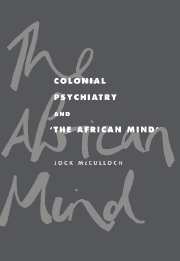Book contents
- Frontmatter
- Contents
- Acknowledgements
- 1 Introduction
- 2 Psychiatry and colonial practice
- 3 Some contemporary reviews of colonial mental health systems
- 4 Towards a theory of the African mind
- 5 Theory into practice: Carothers and the politics of Mau Mau
- 6 African intelligence, sexuality and psyche
- 7 The African family and the colonial personality
- 8 The elements of orthodoxy
- 9 From psychiatry to politics
- 10 Conclusion
- Notes
- Bibliography
- Index
7 - The African family and the colonial personality
Published online by Cambridge University Press: 04 December 2009
- Frontmatter
- Contents
- Acknowledgements
- 1 Introduction
- 2 Psychiatry and colonial practice
- 3 Some contemporary reviews of colonial mental health systems
- 4 Towards a theory of the African mind
- 5 Theory into practice: Carothers and the politics of Mau Mau
- 6 African intelligence, sexuality and psyche
- 7 The African family and the colonial personality
- 8 The elements of orthodoxy
- 9 From psychiatry to politics
- 10 Conclusion
- Notes
- Bibliography
- Index
Summary
Ethnopsychiatric theory offered various reasons for African inferiority. Vint believed the structure of the cortex to be at fault, while Carothers vacillated between brain morphology and environment. There was no clear progression from physiology to non-material factors, and even within a single work both types of explanation were employed. Even so, over time the analysis of culture became more important. Theorists who were interested in culture were drawn inevitably towards the study of the family.
Laubscher, Biesheuvel and Sachs all made reference to the role of the African family in shaping the child's world, but none of these writers presented an explicit theory of the family or commented at any length upon the relationship between the infant and its mother. In light of the importance attached by psychologists and indeed by colonial practice to familial relations, this silence is surprising. In Britain from the 1880s to the 1930s, many social reformers saw effective mothering as the key to the vitality of the white race, and created various programmes aimed at improving the skills of British mothers. By the end of that period similar programmes, although on a modest scale, were introduced into British colonies. As we have seen the Jeanes' Movement, which was active in four colonies during the 1930s, was dedicated to improving the life and culture of colonial Africans by enhancing the mothercraft and domestic skills of African women.
Nineteenth-century scientists such as Francis Galton sought to discover ways to improve the quality of citizens through various means, including selective breeding.
- Type
- Chapter
- Information
- Colonial Psychiatry and the African Mind , pp. 91 - 104Publisher: Cambridge University PressPrint publication year: 1995



